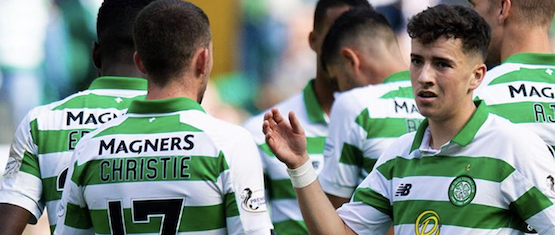Celtic plc said late on Friday its revenue fell 17.9% to £83.4 million in the year to June 30 and profit before tax fell to £11.3 million from £17.3 million a year earlier.
The results reflected a financial year in which the club did not qualify for the group stages of the UEFA Champions League, as it had done in the prior year.
Operating expenses including labour fell 0.2% to £86.9 million. Total labour costs were £56.1 million.
The company reported a gain on sale of players of £17.7 million and year-end net cash, net of debt and debt-like items, of £38.9 million.
Celtic’s sale of Kieran Tierney to Arsenal for £25 million happened after the financial year.
Highlights of the year for Celtic included winning the Scottish domestic treble for an unprecedented third consecutive year — the “Treble Treble” — and winning its eighth consecutive SPFL Premiership title.
Celtic finished second in the Europa League group stage, qualifying for the Round of 32 for the second year in a row.
Celtic CEO Peter Lawwell said: “Each year, our key football objective is success in all three domestic competitions and progress in the UEFA Champions League.
“Although we can be satisfied with our success in domestic football, we are very disappointed that the club failed to qualify for the group stages of the UEFA Champions League in season 2018/19 and 2019/20, although the team did well to qualify in second place in a demanding UEFA Europa League group last season.
“For season 2019/20, we have secured qualification for the group stages of the UEFA Europa League to ensure European football this season and our domestic performances have been promising. We look forward to the season ahead.
“The level of competition in European football continues to intensify, increasing the uncertainty connected with qualification and progression within UEFA competitions.
“The club’s long term strategy enables the board to continue to invest in player retention, player recruitment, stadium infrastructure and everything that is needed to develop the club for future generations and to continue to deliver success, notwithstanding the failure to qualify for the group stages of the UEFA Champions League.
“The board continues to be committed to investing in our football operations and the creation of a world class football club, not only in transfer fees and player wages (which continue to be subject to hyper inflation), but also on football management, coaching, recruitment, medical, performance, sports science and the youth academy.
“During the period, despite the 17.9% reduction in revenues we maintained a very high level of investment in total labour costs of £56.1m.
“Player development and recruitment continue to be fundamental to the club to augment our first team squad and to add to the players being developed in the Academy.
“Although we work to conclude transfers as quickly as possible, the transfer market remains challenging.
“We continue to invest in player recruitment, to create value, but without putting the club at risk.
“After the period end, we signed eight players on permanent transfers, including players for the first team as well as younger players to add to the talented young players we have in our Academy, to which we added loan transfers of three high quality players from the English Premier League and English Championship.
“The challenges in the transfer market demonstrate the importance of our Academy and we continue to develop the Academy for the future.
“The objective remains to identify and develop Champions League football players for the club …”
